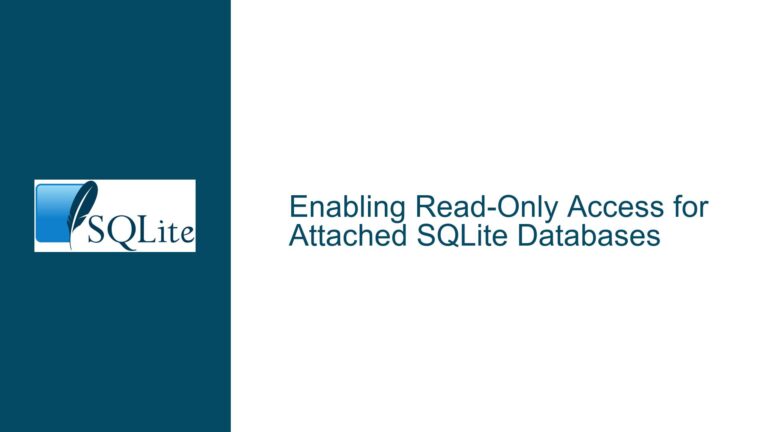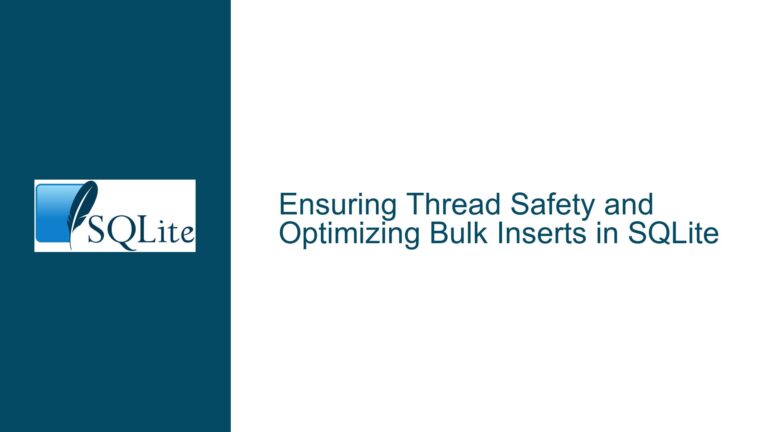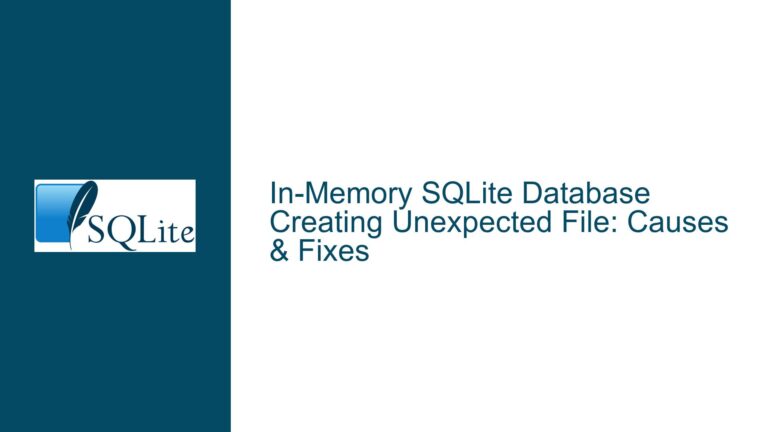SQLite Query Output to CSV File in C++ Using Lambda Functions
SQLite Query Output to CSV File in C++ Using Lambda Functions
When working with SQLite in C++, a common task is to execute a query and export the results to a CSV file. This process can be streamlined using lambda functions, which allow for inline, anonymous functions that can capture variables from their surrounding scope. However, integrating lambda functions with SQLite’s sqlite3_exec function can present challenges, particularly when attempting to capture and use external resources like file streams within the lambda. This guide will explore the core issue, its possible causes, and detailed troubleshooting steps to resolve the problem.
Variable Capture Issues in Lambda Functions with SQLite3_exec
The primary issue arises when attempting to capture an ofstream object (outPutFile) within a lambda function used as a callback in sqlite3_exec. The lambda function is designed to process each row of the query result and output it to both the console and a CSV file. However, the lambda function cannot implicitly capture the outPutFile variable because it is not part of the lambda’s capture list. When attempting to capture outPutFile by reference using [&outPutFile], the sqlite3_exec function call fails because the lambda’s signature no longer matches the expected function pointer type.
The sqlite3_exec function expects a callback with the signature int (*callback)(void*, int, char**, char**), where the first parameter is a void* pointer to user data. The lambda function must conform to this signature, which complicates the capture of external variables like outPutFile. The error message "Variable ‘outPutFile’ cannot be implicitly captured in a lambda with no capture-default specified" indicates that the lambda function is not correctly capturing the outPutFile object. The subsequent error, "No matching function for call to ‘sqlite3_exec’", occurs because the lambda’s signature changes when it captures outPutFile, making it incompatible with the expected callback type.
Interrupted Write Operations Leading to Index Corruption
The root cause of this issue lies in the way lambda functions handle variable capture and how sqlite3_exec expects its callback function to be structured. Lambda functions in C++ can capture variables from their surrounding scope, but this capture must be explicitly specified in the lambda’s capture list. When outPutFile is captured by reference using [&outPutFile], the lambda function’s type changes, and it no longer matches the function pointer type expected by sqlite3_exec. This mismatch results in a compilation error.
Additionally, the sqlite3_exec function is designed to work with C-style function pointers, which do not support capturing external state. This limitation means that any external resources, such as file streams, must be passed through the void* data parameter provided by sqlite3_exec. This parameter allows the callback function to access external data, but it requires a more manual approach to data management.
Implementing a Context Structure for Lambda Function Data Management
To resolve this issue, a Context structure can be used to pass both the ofstream object and any other necessary data to the lambda function through the void* data parameter. This approach effectively "desugars" the lambda’s capture mechanism, allowing the lambda function to access external resources without changing its signature.
The Context structure should contain pointers to the ofstream object and any other data structures needed by the lambda function. For example, if the lambda function needs to store the query results in a std::vector<std::vector<std::string>>, the Context structure should include a pointer to this vector. The sqlite3_exec function can then be called with a pointer to an instance of this Context structure, and the lambda function can cast the void* data parameter back to a Context* to access the required resources.
Here is an example implementation of the Context structure and its use with sqlite3_exec:
struct Context {
std::ofstream* pOutputFile;
std::vector<std::vector<std::string>>* pTableData;
};
Context context{&outPutFile, &tableData};
int rc = sqlite3_exec(db, sql.c_str(), [](void* data, int argc, char** argv, char** colNames) {
Context* pContext = static_cast<Context*>(data);
auto& outputFile = *pContext->pOutputFile;
auto& tableData = *pContext->pTableData;
std::vector<std::string> rowData;
for (int i = 0; i < argc; i++) {
rowData.push_back(argv[i] ? argv[i] : "NULL");
outputFile << rowData[i] << ";";
std::cout << rowData[i] << " ";
if (i == argc - 1) {
std::cout << std::endl;
}
}
tableData.push_back(rowData);
return 0;
}, &context, &errMsg);
In this implementation, the Context structure contains pointers to the ofstream object (outPutFile) and the std::vector<std::vector<std::string>> object (tableData). The sqlite3_exec function is called with a pointer to an instance of this Context structure. Inside the lambda function, the void* data parameter is cast back to a Context*, allowing access to the ofstream and std::vector<std::vector<std::string>> objects.
This approach ensures that the lambda function’s signature remains compatible with the sqlite3_exec function’s expectations while still allowing access to external resources. The ofstream object can be used to write the query results to a CSV file, and the std::vector<std::vector<std::string>> object can be used to store the query results for further processing.
Alternative Approaches and Considerations
While the Context structure approach is effective, there are alternative methods for achieving the same result. One such method is to use a std::function object within the Context structure to store a capturing lambda. This approach allows for more flexibility in the lambda’s implementation but requires additional boilerplate code to manage the std::function object.
Another consideration is the performance impact of writing to a file within the lambda function. Writing to a file for each row of the query result can be inefficient, especially for large datasets. In such cases, it may be more efficient to store the query results in memory (e.g., in a std::vector<std::vector<std::string>>) and write them to the file in a separate loop after the sqlite3_exec call. This approach reduces the number of file I/O operations and can improve performance.
Here is an example of storing the query results in memory and writing them to a file after the sqlite3_exec call:
std::vector<std::vector<std::string>> tableData;
int rc = sqlite3_exec(db, sql.c_str(), [](void* data, int argc, char** argv, char** colNames) {
auto& tableData = *static_cast<std::vector<std::vector<std::string>>*>(data);
std::vector<std::string> rowData;
for (int i = 0; i < argc; i++) {
rowData.push_back(argv[i] ? argv[i] : "NULL");
std::cout << rowData[i] << " ";
if (i == argc - 1) {
std::cout << std::endl;
}
}
tableData.push_back(rowData);
return 0;
}, &tableData, &errMsg);
for (const auto& row : tableData) {
for (const auto& cell : row) {
outPutFile << cell << ";";
}
outPutFile << std::endl;
}
In this implementation, the query results are stored in the tableData vector during the sqlite3_exec call. After the call, a separate loop writes the contents of tableData to the outPutFile. This approach minimizes file I/O operations during the query execution, which can be beneficial for performance.
Conclusion
Exporting SQLite query results to a CSV file in C++ using lambda functions can be challenging due to the limitations of variable capture and the requirements of the sqlite3_exec function. By using a Context structure to pass external resources to the lambda function, it is possible to work around these limitations and achieve the desired functionality. Additionally, considering alternative approaches, such as storing query results in memory and writing them to a file after the query execution, can improve performance and simplify the code.
This guide has provided a detailed exploration of the issue, its causes, and potential solutions. By following the outlined steps and considering the alternative approaches, developers can effectively export SQLite query results to CSV files in C++ while maintaining clean and efficient code.






